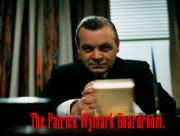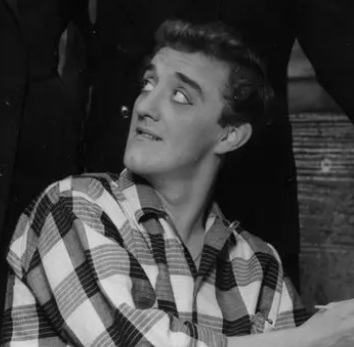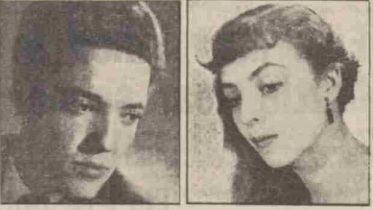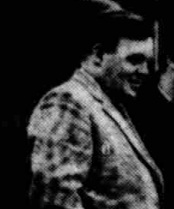
PICCOLO THEATRE COMPANY

Oldham-born Bernard Cribbins - ASM and star of Arsenic and Old Lace
The Piccolo Theatre Company was set up in 1954 by director Frank Dunlop and designer Richard Negri, graduates of the Old Vic Theatre School in London. Piccolo was based in a public hall above the Wilbraham Road Conservative Club in Chorlton-cum-Hardy, Manchester and was licensed as a members-only theatre club (although the management appears to have been lax in attention to this detail).
Negri had been designing for a year at the Oldham Coliseum before a small inheritance spurred him to join Dunlop in launching their own theatre group. Dunlop and Negri were joined in this venture by Old Vic graduates such as James Maxwell, Casper Wrede, Dilys Hamlett, Eric Thompson, Lee Montague, Avril Elgar and Rosalind Knight.Patrick Wymark was still in San Diego as artist-in-residence at this time.
The Spring season launched on 17 March with an address from one of the patrons, Peggy Ashcroft, who recalled the achievements of the Old Vic Theatre School. The opening production was a comedy by the Quintero Brothers, The Women Have Their Way . This was followed by Joseph Kesselring's Arsenic and Old Lace starring Bernard Cribbins (a graduate of the Oldham Coliseum who was also Assistant Stage Manager). Cribbins played the Cary Grant role of the nephew who discovers that his dotty aunts (Avril Elgar and Dilys Hamlett) are murderers. The rest of the opening season featured >She Stoops To Conquer (in modern dress) , Maria Marten (Or The Murder In The Red Barn) , played "with absolute sincerity rather than barnstorming parody" by Eric Thompson and Avril Elgar, The Taming of the Shrew , Guilty (based on Therese Raquin ) with Eric Thompson and Avril Elgar as the guilty lovers and Bernard Cribbins providing welcome banter, and in June Moliere's Don Juan .

Eric Thompson and Avril Elgar.
After a summer break during which the company presented Maria Marten at the Cambridge Arts Theatre and Joseph Chiari's play Mary Stuart at the Edinburgh Festival (with a guest appearance by Catherine Lacey as Mary Queen of Scots) the company returned to Chorlton-cum-Hardy where Patrick Wymark now joined the company having returned from his stint as artist-in-residence at San Diego.

Patrick Wymark
With the aid of an Arts Council grant, the group began its six play season with Goldoni's The Mistress of the Inn directed by George Devine (one of the founders of the Old Vic Theatre School). As a curtain raiser, Patrick Wymark gave "a moving performance" as the old Russian actor in Chekov's Swan Song. This was followed on November 9th by The Playboy of the Western World with Mike Morgan as Christy Mahon and "the old Mahon of Patrick Wymark another admirable study."
The next production in November was The Barber of Beaumarchais , the original version of The Barber of Seville , with specially written music played by John McGregor on a piano"contrived to sound like a harpsichord.". James Maxwell played a versatile Count Almaviva in two disguises, Mike Morgan played "the rogueish Figaro that Beaumarchais must have intended", and Patrick Wymark played Dr Bartolo, "another brilliant characterization of an elderly part, remarkable alike in make-up, deportment and delivery for so young a player."
December 7th saw Frank Dunlop's production of Twelfth Night . Alan Bendle's review in the Manchester Evening News noted Patrick Wymark as "a subtle Sir Toby" with Mike Morgan as Aguecheek and Eric Thompson as a singing Feste. Bendle noted that the production was a little slow paced and, "a good many people who had come from a distance had to leave before the end."
This was followed by Treasure Island a crowd-pleasing Christmas show with Eric Thompson playing Long John Silver as "a likeable blackguard", Mike Morgan as a "spider-legged" Ben Gunn and James Maxwell commanding as Captain Smollett while Richard Negri's sets were, "an object lesson in how to make the most of a small stage."
Unfortunately, Richard Negri told the press in December 1954 that the Arts Council funding had been undermined by poor receipts and increased rent charges. Continued Arts Council funding depended on the Piccolo Theatre Company finding a base closer to the centre of Manchester. As this was not available, the company wound up with Patrick Wymark departing to join the Shakespeare Memorial Theatre in Stratford.
On 14 January 1955, The Manchester Evening News reported that the lease of the upstairs floor of the Conservative Club had been ended with the departure of the Piccolo Theatre, and property belonging to the Chorlton Repertory Club had been accepted by the Conservative Club in lieu of back rent.
Many of those involved in the company, including Patrick Wymark, would regroup as the 59 Theatre Company at the Lyric Hammersmith. The Piccolo Theatre Company formed the beginnings of what is now the Royal Exchange Theatre in Manchester.